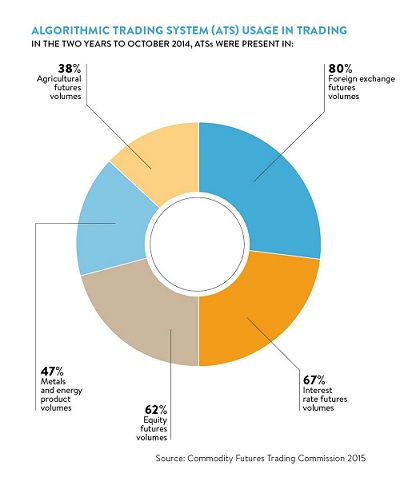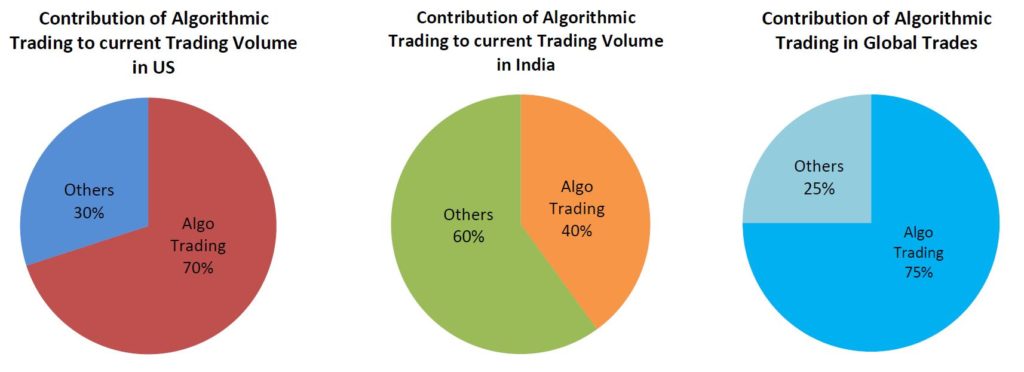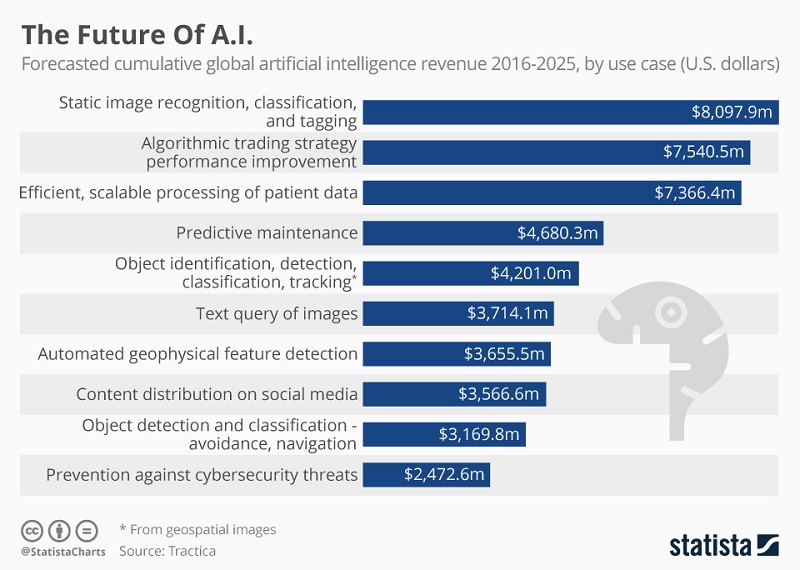By Viraj Bhagat
Looking back to the primitive times, when the fire was the greatest achievement of mankind, who could’ve thought in their wildest dreams about what we as humans have achieved today?
I’m often amazed at the fantastic journey of trading from the basic Euclidean algorithm in 300 BC to the modern-day algorithms. Look at the speed with which information can travel across the planet.
Today, algorithmic trading is amongst the most talked about technologies in the recent years. It has given trading Firms more power in the rapidly evolving markets by eliminating human errors and changing the way Financial markets are interlinked today. Its usage is credited to most markets and even to commodity trading as seen in the chart here:

The global market for Algorithmic Trading estimated at US$14.7 Billion in the year 2020, is expected to garner US$31.1 Billion by 2027, growing at a CAGR of 11.3% over the period 2020 to 2027.
We are curious to know many other factors pertaining to the subject. We wish to know what the future of algorithmic trading would be like.
We desire to learn the secrets of trading that it would hold for us.
That is exactly what we are exploring in this blog here.
Why should one choose Algorithmic trading?
The past few years have seen the impeccable rise of Algorithmic trading to eminence. Some of the best performing hedge funds attribute their success to it. Devoid of human emotions, repelling latency, technology-oriented and fast-paced, Algorithmic trading executes trading commands instantly and with accuracy.
Currently, trading is happening in the span of microseconds and going on to Nanoseconds, with just one millisecond accounting for millions in revenue per year from market trades. Anonymity, Cost, and Speed are few of the many desirable qualities of Algo trading besides ease of use, customization, etc.

As geographies in the field of trading accelerate towards being inconsequential, the events occurring in any market across the planet are almost simultaneously realized and create a positive impact.
It would only be fair to evolve with the evolution.
Who are onboard the bandwagon?
- Major trading firms
- Brokerage firms
- Retailers
- Multinational investment banks with high-level investments
This already has had a domino effect on all the fields as these facets are interconnected and have had a remarkable influence on the opportunities, development, and progress of each other.

Chart 1 and 2 - Source: Morton Glantz, Robert Kissell; Chart 3 - Source: Thomson Reuters
With the majority of trading across many countries being automated and reliable on Algorithmic Trading, it has dramatically altered the Trading scenario. This without a doubt gives us all the more a reason to start using it.
What is astonishing is that India is ushering into an economic and technological revolution that will completely metamorphose the digital scene! This shift is also accelerating the adoption of algorithmic trading in India, driven by faster infrastructure, growing retail participation, and evolving market regulations.

Faster speeds mean swift and efficient vigilance, monitoring, security and a robust architecture. Knowledge of programming and building systems, cautious use and thorough testing will help Analytical Traders implement the right strategies in a foolproof manner. Even though the system becomes self-reliant, the progress and functions will need to be kept in check with a constant evaluation which would give rise to growing career opportunities with multiple profiles.
Quant jobs such as Quant research analyst, derivatives trader, business analyst, consultants, quant developer, strategy analyst would arise in derivatives, trading, electronic market-making and risk management.
Regulations in Algorithmic Trading
Regulations govern and work towards eliminating any threats to that particular market. But in doing so, it has to often stifle with innovation and keep checks in place to avoid malpractices or misuse. It is essential that regulators are well versed in the operation of algorithms and have the flexibility to be able to engage in new legislation where required.
Recently the legislation in Europe has encouraged automation, many regulatory improvements and changes have tipped their hats in the favour of algorithmic trading and High Frequency Trading (HFT) as it brings about transparency and accountability. This has paved way for its growth and proliferation.
The challenges are mainly insufficient risk valuation capabilities and operational efficiencies within the already fragmented market.
Machine Learning and Algorithmic Trading
Machine learning adds a layer of intelligence on top of algorithms by providing powerful tools to extract patterns from data processed all across the globe, giving technology the opportunity to study it in real time. The intelligent machine could very well lead the entire trading revolution owing to its evolution and newer technologies becoming predominant with every passing day, those like:
- Quantum Computing
- Cryptocurrency
- Blockchain technology
- Cloud Computing
- Fintechs
- Big Data
- Internet of Things IoT, etc.
Combination of Machine Learning with the following technologies could create wonders:
- Use of nanotechnology in trading
- Custom chips that allow HFT execution in 74 nanoseconds could further evolve to attract investments worth millions (Source: snipethetrade website)
- Superfast microwave transmission technology that transmits data at the speed of light
- Companies that use crypto-currency for services could increase in numbers
- Achievements like further reduction of latency to less than 20 nanoseconds, etc.
Artificial Intelligence and Algorithmic Trading
Artificial Intelligence (A.I.) might be able to trade in and out without any repercussions by itself as it would drive improvements for trading strategies.

Trading Systems of the Future
The future systems could study all the historical data that we have archived over the course of the entire trading history, analyze it with ease to find out the trends, what would work and what would not. It could also teach itself to predict the future markets with ease while trading multiple accounts and strategies to spread risk and reject or accept real-time bids and offers.
If the market does not favour your trading strategy rules, the system’s self-learn algorithms would adjust trading to different patterns and alter the rules to match market conditions.
It could be capable of checking out multiple market conditions across the globe simultaneously saving a lot of time and eliminating any possibility of the slightest gap in time or occurrence of an error.
Market crashes might become a thing of the past with trading become sentient and realizing the impact of a buy/sell gone wrong, or market volatility to dip in the exchange and rising up to the challenge to recover from that without any human intervention. We can thus expect the elimination of certain discrepancies like Flash Crashes.
Algorithms could be programmed into the chips directly for increased efficiency and easier communication. Specific global regulation and kill-switches could also be programmed.
Imagine a system so powerful, with a vast reach with Big Data and connectivity like the likes of the IoT rapid internet speed and gigaflops of processing power incorporating structured and unstructured data, utilizing real-time global news feed, with LIVE social media and current and historical stock data across the globe in one algorithmic engine.
Now THAT would be something.
Bonus Content
Here are some of the most commonly asked questions which we came across during our Ask Me Anything session on Algorithmic Trading.
Question: If I have a program which shows realistic back-test and forward test results, how should I handle it in the future to keep it consistently profitable in the market?
Reply: Consistently profitability for a strategy can be a difficult thing, it does not happen that you will have one strategy and you keep making money out of it. This is one of the most asked questions even from our participants. You need to look at it as a business, trading is a serious business, it is not about just buying and selling though that is what ultimately you do eventually it’s about business. Any business is about the margins you are keeping and what are the competitive edges that you are acquiring, if you have a trading strategy and you think it will keep on making you money, it might not work that way.
It is important to have competitive edges and same goes for a trading strategy, you will need to keep on fine-tuning it because markets will keep on changing and more importantly the market micro-structure will keep on changing. It is better to keep evolving your strategy and basically every day you have to take a step forward since you cannot stand still and hope to cover the whole journey.
Question: What is the role of algo trading in the Cryptocurrency boom?
Reply: There is nothing much, it’s a very different ball game. There are few international EPAT participants based out of different locations in the world who have been working on Cryptocurrency related projects and have also created systems for trading Cryptocurrencies using automation tools given that some of the Cryptocurrency exchanges do give API excess. That’s there but I don’t think there is any role of algorithmic trading. It is definitely not because of people using algorithms to buy Cryptocurrencies just that people are trying to invest in whichever way they can and yes the kind of volatility is very different. So to answer the question again, I don’t think there is any role of algorithmic trading as of now in the Cryptocurrency domain.
If you wish to build expertise despite the current landscape, you can consider a Crypto Trading Course to strengthen your understanding and skills.
Question: Will Artificial Intelligence algorithms change the future of algo trading?
Reply: It definitely will be giving a lot of power to individual and retail traders in addition to the big institutions because with AI and ML it’s not just about the speed of execution. For faster execution, you need high-end infrastructure which becomes out of question for a lot of traders. But a lot of analysis can be done on the cloud and that has become much cheaper as compared to the physical infrastructure if you had to own and that is what you need for training your algorithms. There are a lot of algorithms in ML and AI like reinforcement, supervise etc. so all these algorithms are available and accessible to the retail traders, with high computing power and affordable cost. This is how it will change how algorithmic trading has been developing and algorithm trading will be doing all the volumes which will be happening in the future, we expect that there will be more retail participation than HFTs or few big institutions.
AI in trading stocks has significantly leveled the playing field for individual traders. With the rise of AI-powered platforms, retail traders now have access to advanced algorithms that were once exclusive to large institutions. This shift is enabling more informed trading decisions, better risk management, and higher precision in strategy implementation. The growth of AI tools in the stock trading space ensures that traders at all levels can harness powerful technologies to compete more effectively.
From self-driven cars to food delivering drones, automation is the way forward and financial sector cannot be left out of that. So more and more automation & tools will keep on coming as people become more aware and learn all these things there will be better tools available for them at better pricing not just for the big institutions but for retail as well.
What’s Next?
We are all familiar with the History of Algorithmic Trading and the Evolution of Algorithmic Trading, and most us have witnessed these changes firsthand or been a part of such remarkable moments that have changed the world forever. But in the process, these moments changed lives, flipped bottom economies to the top and put a common man having the knowledge of Algorithmic trading at par with some of the best minds in the business.
The trading of the future will be based on so many newer technologies that we cannot even fathom to imagine. It would definitely be worth the wait to see where we stand in terms of trading in the future.
The future is the algorithm. The next step in the evolution of trading is the algorithm. It is tremendous.
Who doesn’t want to be a part of this amazing journey! You too could begin with basic concepts like automated trading architecture, market microstructure, strategy backtesting system and order management system and then pave your own path.
And if you want to learn the various aspects of Algorithmic trading then you need to check out the most comprehensive algo trading course EPAT by QuantInsti that equips you with the required skill sets to be a successful top algorithmic trader.
Disclaimer: All data and information provided in this article are for informational purposes only. QuantInsti® makes no representations as to accuracy, completeness, currentness, suitability, or validity of any information in this article and will not be liable for any errors, omissions, or delays in this information or any losses, injuries, or damages arising from its display or use. All information is provided on an as-is basis.

